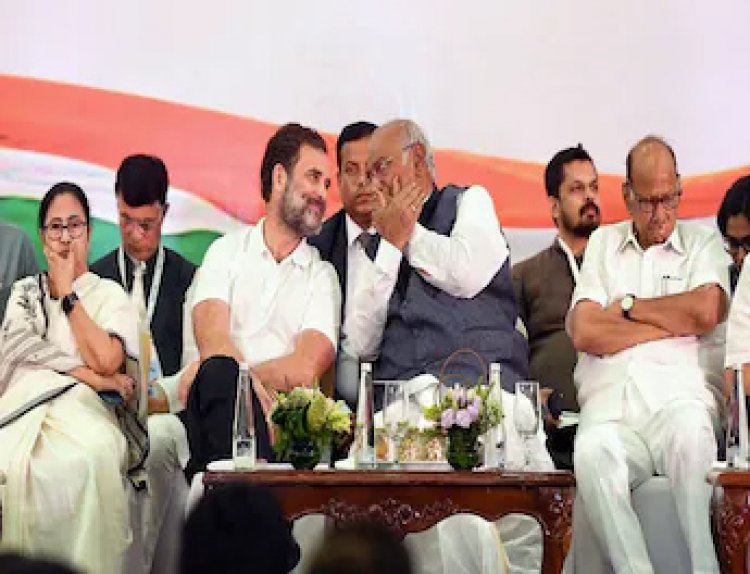Jammu and Kashmir: India Bloc in Disarray
STORIES, ANALYSES, EXPERT VIEWS

Prime Minister Narendra Modi last week addressed an election rally in Jammu and Kashmir’s Udhampur, in which he said that time is not far for holding Assembly elections and for the restoration of J&K’s statehood. He claimed that after decades, Jammu and Kashmir is finally having a Lok Sabha election without fear of terrorism and threats of cross-border firing. He said that this election is not just to elect MPs, but to form a strong government in the country. He challenged any Opposition party, especially Congress, to bring back Article 370, which was abrogated in 2019.
INDIA’s inability to unify the Opposition
Jammu and Kashmir contributes only five seats to the Lower House of Parliament, but even in its truncated version as a union territory (the Kashmir valley has three seats and Jammu two), its symbolic significance stands undiminished for the BJP and INDIA. A recent development classically illustrates INDIA’s inability to unify the Opposition, which includes the National Conference (NC), led by the Abdullahs, and the People’s Democratic Party (PDP), headed by Mehbooba Mufti. Notwithstanding the earlier averments of an alliance, the NC and the PDP decided to fight each other in the Valley and have fielded their own candidates. The Congress failed to cement the grouping.
According to Radhika Ramaseshan (Senior Journalist) “either the Congress lacked the political and moral authority to broker peace between the Abdullahs and Mehbooba Mufti or the party thought it more ‘prudent’ to go with the former. However, it is useful to recall that a splintered Opposition could give the BJP the opening it sorely needs in the Valley. Moreover, the NC and the PDP have partnered with the BJP in the past after shedding their supposed aversions to its ideology.”
Army inquiry in Rajouri deaths: upholding justice
Other than election politics, there are positive developments in the valley in an effort by the Centre to win the hearts and minds of the people.
This concerns the aftermath of the incident of December 21, 2023 which allegedly became a trigger for some officers and other soldiers to interrogate a few local villagers who they suspected of giving support to terrorists. Three civilians from Top Pir village in thee nearby Rajouri district died, allegedly due to torture, while several others suffered injuries. The Defence Minister visited the area and told the troops, ‘You are the country’s protectors. But I want to request that besides ensuring the country’s security, you also have the responsibility to win the hearts of the people. There should be no mistake that hurts an Indian,’ he said.
“It was a fine statement and timed appropriately,” writes Syed Ata Hasnain (former corps commander of the Srinagar-based 15 Corps). The Minister had also asked the Army to inquire into the matter transparently. That inquiry has concluded with reports of serious lapses by seven to eight personnel, including some officers.
Accountability, support and investigation — in equal measure
In this context, Hasnain writes "the public must be aware of three things: First, countering proxy war operations demands a high sense of balance on the part of security forces at every stage. There will be several successes to celebrate but there will also be setbacks involving casualties and other losses. The operating environment demands a very high level of decentralisation, going down to tactical and sub-tactical levels because quick decisions are required on actionable intelligence. At the operational level, all the support is provided — technology, higher intelligence analyses, information warfare, programmes to win hearts and minds……
“The second thing for public knowledge is the fact that the Army will always be vulnerable to its reputation being targeted — this is done to undermine its ability to keep the people of the region on its side. People are the ‘centre of gravity’ in such operations. Terrorists and separatists would always try to tarnish the image of the Army and compromise its relationship with the people. Their intent is to reduce intelligence flow and garner public backing and logistics for the terrorists.
“The third imperative in this environment is that allegations against the Army’s probity must be correctly judged at the highest levels. Investigating every allegation levelled by vested interests will demoralise soldiers. However, those considered serious enough must be probed within an appropriate time-frame and the process of justice taken to its logical conclusion in a fair manner….”
Evaluating the possible removal of AFSPA
The investigation on the Rajouri case writers Hasnain “is taking place at a very critical juncture. There are indications of a possible removal of AFSPA from all or some segments of J&K. It’s early to speculate on such an important issue. One of the major provisions of AFSPA is the protection it affords to Army personnel from prosecution without the Centre’s sanction, for an act committed on duty. However, when the Army and the establishment continue to demonstrate a high level of transparency in investigation and prosecution of all cases, the need for AFSPA-like protection will itself be diluted. That is how we need to view due processes in such cases of alleged misdemeanour while countering terror operations in a challenging environment.”
















